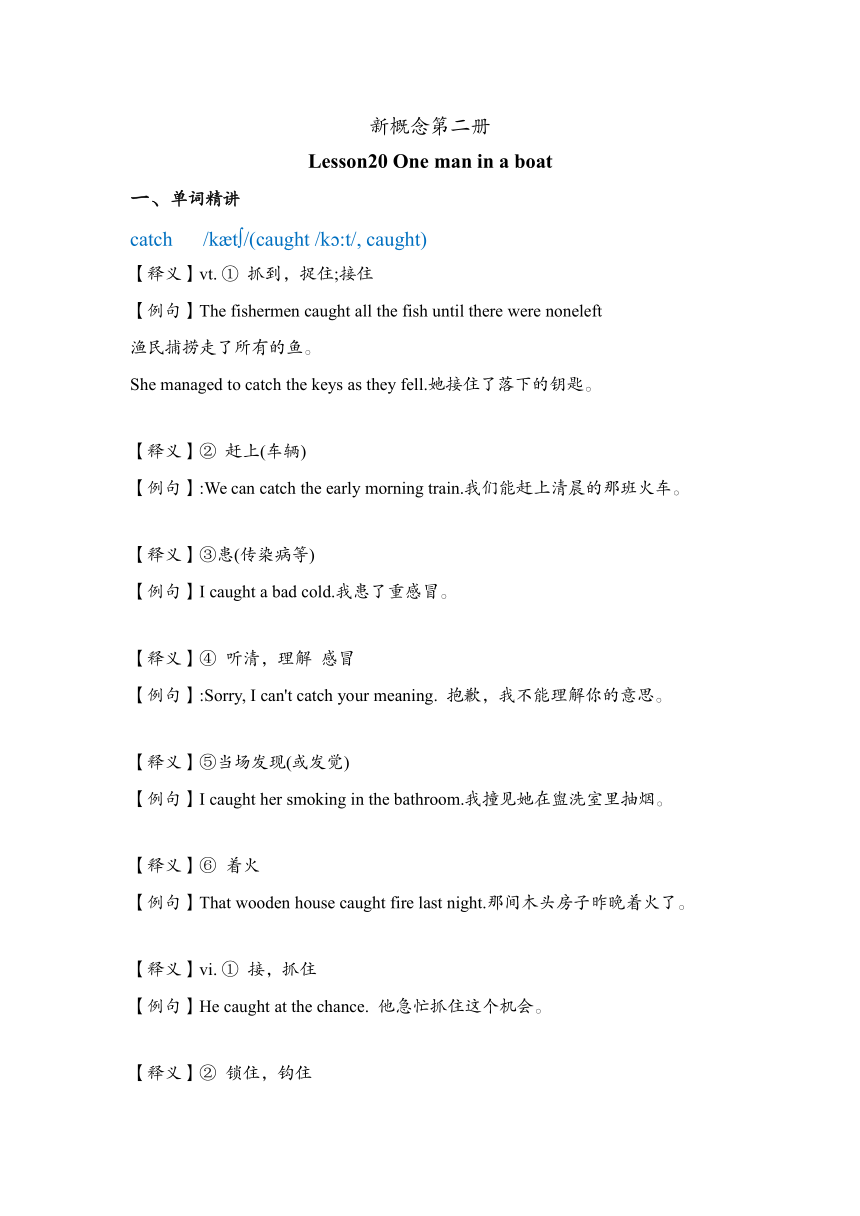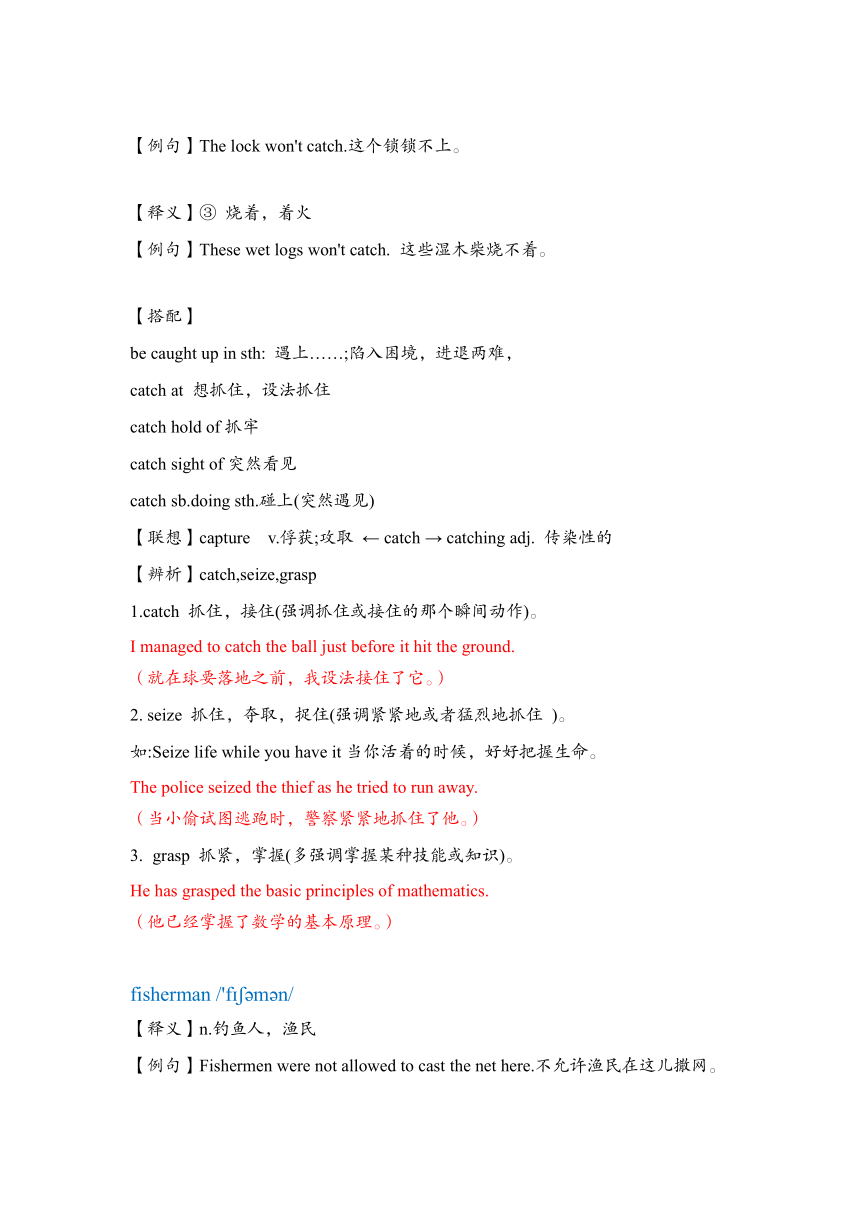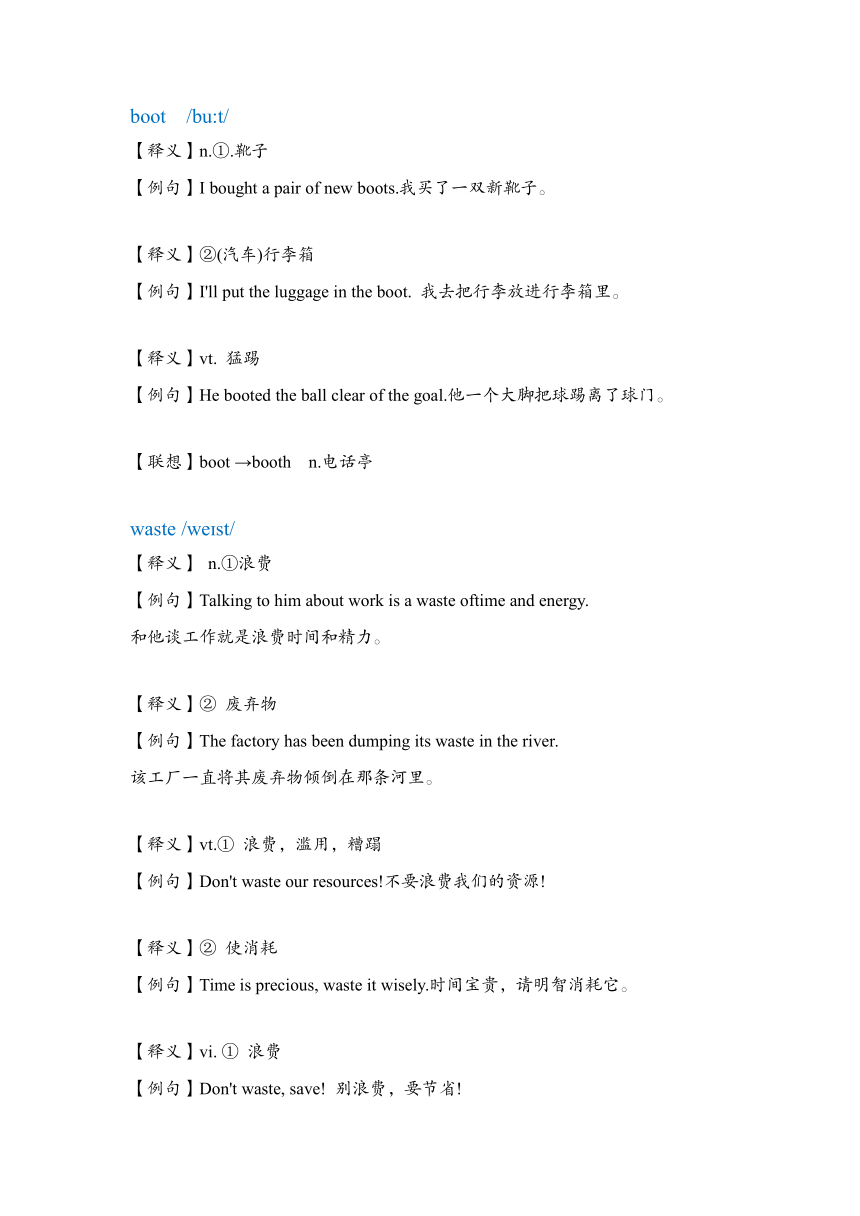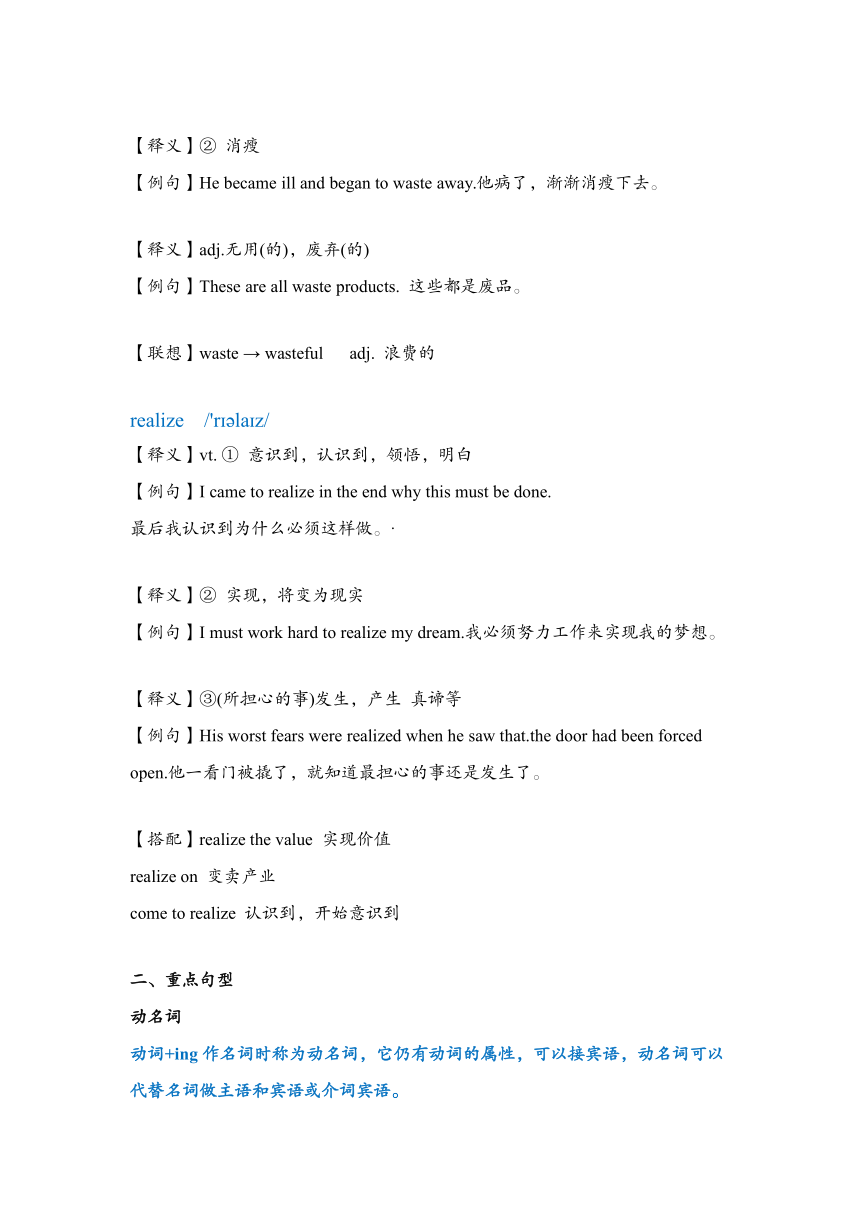新概念第二册Lesson20 One man in a boat讲义
文档属性
| 名称 | 新概念第二册Lesson20 One man in a boat讲义 |  | |
| 格式 | docx | ||
| 文件大小 | 341.6KB | ||
| 资源类型 | 教案 | ||
| 版本资源 | 新概念英语 | ||
| 科目 | 英语 | ||
| 更新时间 | 2024-11-21 07:23:18 | ||
图片预览




文档简介
新概念第二册
Lesson20 One man in a boat
一、单词精讲
catch /k t∫/(caught /k :t/, caught)
【释义】vt. ① 抓到,捉住;接住
【例句】The fishermen caught all the fish until there were noneleft
渔民捕捞走了所有的鱼。
She managed to catch the keys as they fell.她接住了落下的钥匙。
【释义】② 赶上(车辆)
【例句】:We can catch the early morning train.我们能赶上清晨的那班火车。
【释义】③患(传染病等)
【例句】I caught a bad cold.我患了重感冒。
【释义】④ 听清,理解 感冒
【例句】:Sorry, I can't catch your meaning. 抱歉,我不能理解你的意思。
【释义】⑤当场发现(或发觉)
【例句】I caught her smoking in the bathroom.我撞见她在盥洗室里抽烟。
【释义】⑥ 着火
【例句】That wooden house caught fire last night.那间木头房子昨晚着火了。
【释义】vi. ① 接,抓住
【例句】He caught at the chance. 他急忙抓住这个机会。
【释义】② 锁住,钩住
【例句】The lock won't catch.这个锁锁不上。
【释义】③ 烧着,着火
【例句】These wet logs won't catch. 这些湿木柴烧不着。
【搭配】
be caught up in sth: 遇上……;陷入困境,进退两难,
catch at 想抓住,设法抓住
catch hold of抓牢
catch sight of突然看见
catch sb.doing sth.碰上(突然遇见)
【联想】capture v.俘获;攻取 ← catch → catching adj. 传染性的
【辨析】catch,seize,grasp
1.catch 抓住,接住(强调抓住或接住的那个瞬间动作)。
I managed to catch the ball just before it hit the ground.
(就在球要落地之前,我设法接住了它。)
2. seize 抓住,夺取,捉住(强调紧紧地或者猛烈地抓住 )。
如:Seize life while you have it当你活着的时候,好好把握生命。
The police seized the thief as he tried to run away.
(当小偷试图逃跑时,警察紧紧地抓住了他。)
grasp 抓紧,掌握(多强调掌握某种技能或知识)。
He has grasped the basic principles of mathematics.
(他已经掌握了数学的基本原理。)
fisherman /'f m n/
【释义】n.钓鱼人,渔民
【例句】Fishermen were not allowed to cast the net here.不允许渔民在这儿撒网。
boot /bu:t/
【释义】n.①.靴子
【例句】I bought a pair of new boots.我买了一双新靴子。
【释义】②(汽车)行李箱
【例句】I'll put the luggage in the boot. 我去把行李放进行李箱里。
【释义】vt. 猛踢
【例句】He booted the ball clear of the goal.他一个大脚把球踢离了球门。
【联想】boot →booth n.电话亭
waste /we st/
【释义】 n.①浪费
【例句】Talking to him about work is a waste oftime and energy.
和他谈工作就是浪费时间和精力。
【释义】② 废弃物
【例句】The factory has been dumping its waste in the river.
该工厂一直将其废弃物倾倒在那条河里。
【释义】vt.① 浪费,滥用,糟蹋
【例句】Don't waste our resources!不要浪费我们的资源!
【释义】② 使消耗
【例句】Time is precious, waste it wisely.时间宝贵,请明智消耗它。
【释义】vi. ① 浪费
【例句】Don't waste, save! 别浪费,要节省!
【释义】② 消瘦
【例句】He became ill and began to waste away.他病了,渐渐消瘦下去。
【释义】adj.无用(的),废弃(的)
【例句】These are all waste products. 这些都是废品。
【联想】waste → wasteful adj. 浪费的
realize /'r la z/
【释义】vt. ① 意识到,认识到,领悟,明白
【例句】I came to realize in the end why this must be done.
最后我认识到为什么必须这样做。·
【释义】② 实现,将变为现实
【例句】I must work hard to realize my dream.我必须努力工作来实现我的梦想。
【释义】③(所担心的事)发生,产生 真谛等
【例句】His worst fears were realized when he saw that.the door had been forced open.他一看门被撬了,就知道最担心的事还是发生了。
【搭配】realize the value 实现价值
realize on 变卖产业
come to realize 认识到,开始意识到
重点句型
动名词
动词+ing作名词时称为动名词,它仍有动词的属性,可以接宾语,动名词可以代替名词做主语和宾语或介词宾语。
1、动名词作主语
2、动名词作宾语
3、利用介词/副词+动名词可以把两个句子连成一个句子apologize for (not) doing sth. 为什么事情而道歉
I must apologize. I interrupted you.
I must apologize for interrupting you.
(for interrupting强调interrupt这个动词)
I must apologize for having interrupted you.
(for having interrupted强调interrupt这个动词先发生,强调时间 (having done))
以上两者为时间概念不同,意思相同
congratulate (sb.) on doing sth. 因……祝贺(某人)
动名词用表示完成时的having+过去分词结构往往强调动名词的动词发生在前面。
4、跟动名词的短语
be keen on doing sth.(热忠于……),
be fond of,be interested in,
enjoy doing sth.,
congratulations on doing sth. (祝贺……)
be afraid of
be up to=be capable of (capable adj.有能力的, 能干的, 有可能的, 可以...的)可以带动名词的介词有:before,after,without,instead of等
5、动名词的否定式是在它前面直接加not。
Exercises C(用括号中的词来连接下列句子, 如需要可对原句进行必要的改动)
She bought a pair of boots. (instead of) She did not get a pair of shoes.
4.(After) She heard the news. She fainted.
after+从句;after prep.+doing
6.(On) I saw the plane coming towards me. I dashed for cover
on (prep.)+doing 一……就……(两个动作必须是同一个人)as soon as 一……就……
the moment +从句 一……就……
以上两个主语不一定是同一个人
三、课文精讲
Fishing is my favourite sport.钓鱼是我特别喜爱的一项运动。
fishing动名词,可以作主语或宾语
★fish
① n. 鱼(不可数名词),鱼的种类(可数)
There are a lot of fishes(表示种类)in the sea.
② v. 钓鱼, 捕鱼
I often fish for hours without catching anything.我经常一钓数小时却一无所获.
for+时间 表示一段时间
for hours=for some hours 数小时
without catching anything作为状语而出现, 表示结果状语。
without是介词,后面一定要加宾语, 动名词catching作without的宾语,without 后面的动作是主语来做的。动名词也有动词的特性,可以有自己的宾语。
without通常表示“缺乏、没有”;当它位于动名词前时,表示“不曾、不”
I can’t repair the car without your help.
They tried to leave the restaurant without paying.
But this does not worry me.但我从不为此烦恼。
★worry
① v. 烦恼,担扰
worry sb. 某人为……烦恼,担扰(作动词一定要加人作宾语, 翻译时从后往前翻,宾语担心)
The house worried me. / My daughter worried me.
① adj. 担心be worried about ……为……担心
Instead of catching fish, they catch old boots and rubbish.
他们往往鱼钓不到,却钓上来些旧靴子和垃圾。
instead of… 我原准备做……但是后来做了……(instead of 后面的词一定是没有做的, 可以放在主句后面)without强调没有做某件事, instead of强调这件事没做成而做成了另外一件事
副词instead“作为替代,反而”,单独使用时一般出现在句尾If you don’t want a holiday in England, why don’t you go to Australia instead
★这句话中的 catching 也是
动名词 , 它作介词 without 的宾语 , 动名词也有动词的特性 , 它可以有自己的宾语
I am even less lucky.我的运气甚至还不及他们。
less是little的比较级,意为“不及,不如,更少”
I spend less time on English than on French.
less+原形 A is less…than B A不如B
I never catch anything ― not even old boots.
我什么东西也未钓到过—就连旧靴子也没有。
never adv. 从不 决不 ;
even adv. 甚至 ;
not even 甚至连 ... 都没有 ; 破折号引出被强调部分 = don't even catch old boots.
After having spent whole mornings on the river, I always go home with an empty bag.我总是在河上呆上整整一上午,然后空着袋子回家。
spend+时间+在某地 在某地度过……时间
after+从句 在……之后
after+名词/动词的ing形式 ……之后(从句主语必须是主句的主语时两种形式可互换)
After I go to school, I learned a lot of knowledge. (用一般式表示一个事实, 不用 “went to” )
After going to school, I learned a lot of knowledge.
介词after的宾语的动名词having spent所表示的动作发生在谓语动词go之前,所以用完成形式。
with an empty bag注意连读
with sth. 有……的,持有……的,随身带着……(状语)Who’s the man with the beard
without sth. 没带……
I always go home without angthing. 什么都没带回家
'You must give up fishing!' my friends say. ‘It 's a waste of time.’
“你可别再钓鱼了!”我的朋友们说,“这是浪费时间。”
give up doing sth. = stop doing sth. 放弃做某事
★ a waste of time 这里的 of 表示动宾关系 , 即 time 是 waste 的逻辑宾语 ; it 指 fishing;
But they don't realize one important thing. I 'm not really interested in fishing.
然而他们没有认识到重要的一点,我并不是真的对钓鱼有兴趣,
realize v. 意识到 实现 ;
realization n. 实现 ;
realize that + 从句 ;
important adj. 重大 重要的
importantly adv. 重要地 ;
unimportant adj. 不重要的 交要的 ;
importance n. 重要性 重大 ;
interest v. 对 ... 感兴趣
be intersted in sth. / doing sth. 对……感兴趣
take interests in ;
in the interest of 为了 ... 的利益 ;
interest n. 利息
annual interest 年息
compound interest 复利
loan interest 贷款利息 ;
I am only interested in sitting in a boat and doing nothing at all!
be interested in 对 .. 感兴趣 ;
take no interest in 对 ... 不感兴趣 ;
take interest in 对 ... 感兴趣 ;
take delight in 对 ... 感到高兴 ;
take pridein 以…为傲 = be proud of; show interest in 显示对 ... 的兴趣 ;
★ nothing at all = not anything at all, at all 常用于否定句或条件句中以加强语气 , 有 " 真的 "," 根本 " 的意思 = indeed;
only adv. 仅仅 强调 = just ;
sit-sat-sat v. 坐 ;
and 连接两个平行并列结构 sitting ... and doing...;
Lesson20 One man in a boat
一、单词精讲
catch /k t∫/(caught /k :t/, caught)
【释义】vt. ① 抓到,捉住;接住
【例句】The fishermen caught all the fish until there were noneleft
渔民捕捞走了所有的鱼。
She managed to catch the keys as they fell.她接住了落下的钥匙。
【释义】② 赶上(车辆)
【例句】:We can catch the early morning train.我们能赶上清晨的那班火车。
【释义】③患(传染病等)
【例句】I caught a bad cold.我患了重感冒。
【释义】④ 听清,理解 感冒
【例句】:Sorry, I can't catch your meaning. 抱歉,我不能理解你的意思。
【释义】⑤当场发现(或发觉)
【例句】I caught her smoking in the bathroom.我撞见她在盥洗室里抽烟。
【释义】⑥ 着火
【例句】That wooden house caught fire last night.那间木头房子昨晚着火了。
【释义】vi. ① 接,抓住
【例句】He caught at the chance. 他急忙抓住这个机会。
【释义】② 锁住,钩住
【例句】The lock won't catch.这个锁锁不上。
【释义】③ 烧着,着火
【例句】These wet logs won't catch. 这些湿木柴烧不着。
【搭配】
be caught up in sth: 遇上……;陷入困境,进退两难,
catch at 想抓住,设法抓住
catch hold of抓牢
catch sight of突然看见
catch sb.doing sth.碰上(突然遇见)
【联想】capture v.俘获;攻取 ← catch → catching adj. 传染性的
【辨析】catch,seize,grasp
1.catch 抓住,接住(强调抓住或接住的那个瞬间动作)。
I managed to catch the ball just before it hit the ground.
(就在球要落地之前,我设法接住了它。)
2. seize 抓住,夺取,捉住(强调紧紧地或者猛烈地抓住 )。
如:Seize life while you have it当你活着的时候,好好把握生命。
The police seized the thief as he tried to run away.
(当小偷试图逃跑时,警察紧紧地抓住了他。)
grasp 抓紧,掌握(多强调掌握某种技能或知识)。
He has grasped the basic principles of mathematics.
(他已经掌握了数学的基本原理。)
fisherman /'f m n/
【释义】n.钓鱼人,渔民
【例句】Fishermen were not allowed to cast the net here.不允许渔民在这儿撒网。
boot /bu:t/
【释义】n.①.靴子
【例句】I bought a pair of new boots.我买了一双新靴子。
【释义】②(汽车)行李箱
【例句】I'll put the luggage in the boot. 我去把行李放进行李箱里。
【释义】vt. 猛踢
【例句】He booted the ball clear of the goal.他一个大脚把球踢离了球门。
【联想】boot →booth n.电话亭
waste /we st/
【释义】 n.①浪费
【例句】Talking to him about work is a waste oftime and energy.
和他谈工作就是浪费时间和精力。
【释义】② 废弃物
【例句】The factory has been dumping its waste in the river.
该工厂一直将其废弃物倾倒在那条河里。
【释义】vt.① 浪费,滥用,糟蹋
【例句】Don't waste our resources!不要浪费我们的资源!
【释义】② 使消耗
【例句】Time is precious, waste it wisely.时间宝贵,请明智消耗它。
【释义】vi. ① 浪费
【例句】Don't waste, save! 别浪费,要节省!
【释义】② 消瘦
【例句】He became ill and began to waste away.他病了,渐渐消瘦下去。
【释义】adj.无用(的),废弃(的)
【例句】These are all waste products. 这些都是废品。
【联想】waste → wasteful adj. 浪费的
realize /'r la z/
【释义】vt. ① 意识到,认识到,领悟,明白
【例句】I came to realize in the end why this must be done.
最后我认识到为什么必须这样做。·
【释义】② 实现,将变为现实
【例句】I must work hard to realize my dream.我必须努力工作来实现我的梦想。
【释义】③(所担心的事)发生,产生 真谛等
【例句】His worst fears were realized when he saw that.the door had been forced open.他一看门被撬了,就知道最担心的事还是发生了。
【搭配】realize the value 实现价值
realize on 变卖产业
come to realize 认识到,开始意识到
重点句型
动名词
动词+ing作名词时称为动名词,它仍有动词的属性,可以接宾语,动名词可以代替名词做主语和宾语或介词宾语。
1、动名词作主语
2、动名词作宾语
3、利用介词/副词+动名词可以把两个句子连成一个句子apologize for (not) doing sth. 为什么事情而道歉
I must apologize. I interrupted you.
I must apologize for interrupting you.
(for interrupting强调interrupt这个动词)
I must apologize for having interrupted you.
(for having interrupted强调interrupt这个动词先发生,强调时间 (having done))
以上两者为时间概念不同,意思相同
congratulate (sb.) on doing sth. 因……祝贺(某人)
动名词用表示完成时的having+过去分词结构往往强调动名词的动词发生在前面。
4、跟动名词的短语
be keen on doing sth.(热忠于……),
be fond of,be interested in,
enjoy doing sth.,
congratulations on doing sth. (祝贺……)
be afraid of
be up to=be capable of (capable adj.有能力的, 能干的, 有可能的, 可以...的)可以带动名词的介词有:before,after,without,instead of等
5、动名词的否定式是在它前面直接加not。
Exercises C(用括号中的词来连接下列句子, 如需要可对原句进行必要的改动)
She bought a pair of boots. (instead of) She did not get a pair of shoes.
4.(After) She heard the news. She fainted.
after+从句;after prep.+doing
6.(On) I saw the plane coming towards me. I dashed for cover
on (prep.)+doing 一……就……(两个动作必须是同一个人)as soon as 一……就……
the moment +从句 一……就……
以上两个主语不一定是同一个人
三、课文精讲
Fishing is my favourite sport.钓鱼是我特别喜爱的一项运动。
fishing动名词,可以作主语或宾语
★fish
① n. 鱼(不可数名词),鱼的种类(可数)
There are a lot of fishes(表示种类)in the sea.
② v. 钓鱼, 捕鱼
I often fish for hours without catching anything.我经常一钓数小时却一无所获.
for+时间 表示一段时间
for hours=for some hours 数小时
without catching anything作为状语而出现, 表示结果状语。
without是介词,后面一定要加宾语, 动名词catching作without的宾语,without 后面的动作是主语来做的。动名词也有动词的特性,可以有自己的宾语。
without通常表示“缺乏、没有”;当它位于动名词前时,表示“不曾、不”
I can’t repair the car without your help.
They tried to leave the restaurant without paying.
But this does not worry me.但我从不为此烦恼。
★worry
① v. 烦恼,担扰
worry sb. 某人为……烦恼,担扰(作动词一定要加人作宾语, 翻译时从后往前翻,宾语担心)
The house worried me. / My daughter worried me.
① adj. 担心be worried about ……为……担心
Instead of catching fish, they catch old boots and rubbish.
他们往往鱼钓不到,却钓上来些旧靴子和垃圾。
instead of… 我原准备做……但是后来做了……(instead of 后面的词一定是没有做的, 可以放在主句后面)without强调没有做某件事, instead of强调这件事没做成而做成了另外一件事
副词instead“作为替代,反而”,单独使用时一般出现在句尾If you don’t want a holiday in England, why don’t you go to Australia instead
★这句话中的 catching 也是
动名词 , 它作介词 without 的宾语 , 动名词也有动词的特性 , 它可以有自己的宾语
I am even less lucky.我的运气甚至还不及他们。
less是little的比较级,意为“不及,不如,更少”
I spend less time on English than on French.
less+原形 A is less…than B A不如B
I never catch anything ― not even old boots.
我什么东西也未钓到过—就连旧靴子也没有。
never adv. 从不 决不 ;
even adv. 甚至 ;
not even 甚至连 ... 都没有 ; 破折号引出被强调部分 = don't even catch old boots.
After having spent whole mornings on the river, I always go home with an empty bag.我总是在河上呆上整整一上午,然后空着袋子回家。
spend+时间+在某地 在某地度过……时间
after+从句 在……之后
after+名词/动词的ing形式 ……之后(从句主语必须是主句的主语时两种形式可互换)
After I go to school, I learned a lot of knowledge. (用一般式表示一个事实, 不用 “went to” )
After going to school, I learned a lot of knowledge.
介词after的宾语的动名词having spent所表示的动作发生在谓语动词go之前,所以用完成形式。
with an empty bag注意连读
with sth. 有……的,持有……的,随身带着……(状语)Who’s the man with the beard
without sth. 没带……
I always go home without angthing. 什么都没带回家
'You must give up fishing!' my friends say. ‘It 's a waste of time.’
“你可别再钓鱼了!”我的朋友们说,“这是浪费时间。”
give up doing sth. = stop doing sth. 放弃做某事
★ a waste of time 这里的 of 表示动宾关系 , 即 time 是 waste 的逻辑宾语 ; it 指 fishing;
But they don't realize one important thing. I 'm not really interested in fishing.
然而他们没有认识到重要的一点,我并不是真的对钓鱼有兴趣,
realize v. 意识到 实现 ;
realization n. 实现 ;
realize that + 从句 ;
important adj. 重大 重要的
importantly adv. 重要地 ;
unimportant adj. 不重要的 交要的 ;
importance n. 重要性 重大 ;
interest v. 对 ... 感兴趣
be intersted in sth. / doing sth. 对……感兴趣
take interests in ;
in the interest of 为了 ... 的利益 ;
interest n. 利息
annual interest 年息
compound interest 复利
loan interest 贷款利息 ;
I am only interested in sitting in a boat and doing nothing at all!
be interested in 对 .. 感兴趣 ;
take no interest in 对 ... 不感兴趣 ;
take interest in 对 ... 感兴趣 ;
take delight in 对 ... 感到高兴 ;
take pridein 以…为傲 = be proud of; show interest in 显示对 ... 的兴趣 ;
★ nothing at all = not anything at all, at all 常用于否定句或条件句中以加强语气 , 有 " 真的 "," 根本 " 的意思 = indeed;
only adv. 仅仅 强调 = just ;
sit-sat-sat v. 坐 ;
and 连接两个平行并列结构 sitting ... and doing...;
同课章节目录
